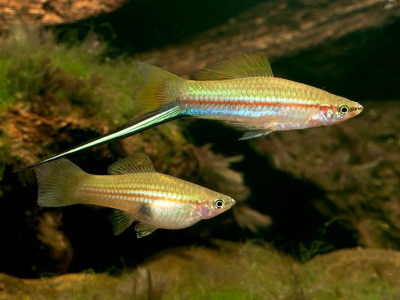Xiphophorus variatus
Variable Platy

Scientific Classification
Quick Stats
Aquarium Building Information
About This Species
Basic Description
Detailed Description
The Variable Platy, scientifically known as Xiphophorus variatus, is a popular and resilient member of the Poeciliidae family, originating from the freshwater systems of Mexico and Guatemala. In its natural environment, it inhabits slow-moving waters, which should be replicated in the aquarium with a low-flow filtration system to prevent stress. This species is highly adaptable but thrives best in neutral to alkaline water that is moderately hard to hard, reflecting the mineral content of its native habitats. As an active and social shoaling fish, it requires being kept in groups to feel secure and exhibit its most interesting behaviors. Without a school, they can become stressed and timid. They predominantly occupy the upper and middle strata of the water column, making them a visible and engaging presence in any setup.
Proper husbandry involves providing a varied diet. As an omnivore, its diet in the wild consists of plant matter, algae, and small invertebrates. In captivity, this should be mimicked with high-quality flake or pellet food as a base, supplemented with frozen or live foods, and vegetable matter like blanched spinach or zucchini. This varied diet is crucial for its health and coloration. This species actively forages, often seen picking at biofilm on surfaces and consuming soft algae or plants, contributing to the tank's micro-ecosystem. Although hardy, they have a medium metabolism and produce a moderate amount of waste, contributing a standard bioload to the aquarium. Therefore, regular water changes and consistent maintenance are necessary to keep the environment clean and stable. Due to their peaceful nature, they are excellent candidates for community tanks, provided their tank mates are not large or aggressive enough to bully or prey on them.
Scientific Description
Xiphophorus variatus is a validated species within the family Poeciliidae, a group commonly referred to as live-bearing toothcarps. Native to Central America, its natural distribution spans freshwater bodies in Mexico and Guatemala. Taxonomically, it belongs to the order Cyprinodontiformes. This species exhibits a compressiform body shape, meaning it is laterally flattened. Morphological distinction between sexes is apparent, a common trait in the genus Xiphophorus, although not as pronounced as in its close relatives, the swordtails.
Ecologically, X. variatus functions as an omnivorous primary and secondary consumer. Its diet consists of a variety of food sources, including algae, detritus, plant matter, and small invertebrates. In its habitat, it plays a role in controlling algal growth and consuming biofilm, contributing to nutrient cycling. Physiologically, this fish is adapted to thrive in water with a notable mineral content, preferring a pH range on the alkaline side of neutral and a considerable level of water hardness. It demonstrates a medium metabolic rate and corresponding oxygen consumption, which aligns with its active and continuous swimming behavior. While strictly a freshwater species, it shows a slight tolerance for low-end brackish conditions. From a conservation standpoint, Xiphophorus variatus is listed as Least Concern (LC) by the IUCN, indicating that it currently has a stable and widespread wild population without immediate threats to its survival.
Breeding Description
Breeding the Variable Platy is considered an easy endeavor, making it an excellent starting point for hobbyists new to aquatic reproduction. This species is a prolific livebearer, meaning the female gives birth to fully formed, free-swimming fry instead of laying eggs. To encourage successful and stress-free breeding, it is highly recommended to maintain a higher ratio of females to males, such as three females for every one male. This prevents any single female from bearing the brunt of a male's persistent courtship.
Sexing adults is straightforward. Males are generally smaller and more slender than females. The most definitive feature is the male's modified anal fin, known as a gonopodium, which is a tube-like organ used for internal fertilization. In contrast, females are typically larger with a more rounded body, especially when gravid, and possess a standard, fan-shaped anal fin. Once fertilized, the female can store sperm and produce several broods of fry over a period of months without further male contact. The gestation period is typically around four to six weeks. To increase the survival rate of the fry, it is advisable to provide a separate, well-established aquarium heavily planted with fine-leaved plants like Java moss or floating plants. These provide ample hiding places for the newborns, as adult platies, including the parents, will predate the fry. If a separate tank is not possible, a commercially available breeding box can be used. The fry are born relatively large and can immediately accept finely crushed flake food, powdered fry food, or newly hatched brine shrimp. Frequent small feedings throughout the day will promote healthy and rapid growth.
Generate Printable Card
Create a printable card for this creature to display in your store or aquarium. The card includes a QR code for quick access to more information.

